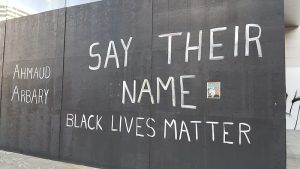In a brief opinion, liberal Justice Sonia Sotomayor encouraged lower courts not to read too much into the decision.
The Supreme Court will allow a Louisiana police officer to continue litigating claims against the Black Lives Matter activist who organized a demonstration that ended in violence.
According to The Associated Press, the justices on Monday rejected an appeal filed on behalf of B.L.M. activist DeRay Mckesson. The court had earlier noted that the case “was fraught with implications on First Amendment rights.”
Although the justices did not offer any explanation for their ruling, Justice Sonia Sotomayor authored a brief opinion advising lower courts not to try and parse too much meaning from the decision.
The court’s denial, Sotomayor said, “expresses no view about the merits of Mckesson’s claim.”
The Associated Press notes that the lawsuit was originally filed on behalf of a Baton Rouge police officer who was hit by a “rock-like” object thrown by an unidentified protester.
Although the culprit was never caught, and a suspected never named, the officer filed a claim against Mckesson in his capacity as the event organizer.
In 2017, a federal judge dismissed the lawsuit—but an appellate panel of the 5th U.S. Circuit Court of Appeals reversed the ruling in a split 2-1 decision, finding that the officer had plausibly alleged that Mckesson had failed to exercise reasonable care when leading Black Lives Matter protesters onto a public highway.
After reaching the highway, protesters engaged in a stand-off with police—during which the plaintiff officer was injured.

Judge Don Wilett, who penned the 5th Circuit dissent, said he disagreed with the panel’s decision to permit a claim against somebody other than the perpetrator.
“[The officer] deserves justice,” Wilett wrote. “Unquestionably, Officer Doe can sue the rock-thrower. But I disagree that he can sue Mckesson as the protest leader.”
The American Civil Liberties Union, which is representing Mckesson, said that finding their client liable for another, unnamed party’s actions could have a chilling effect on free speech and discourage others from exercising their rights to protest.
“Given the prospect that some individual protest participant might engage in law-breaking, only the most intrepid citizens would exercise their rights if doing so risked personal liability for third-parties’ wrongdoing,” the American Civil Liberties Union told the court.
“It is unfathomable under this Court’s First Amendment jurisprudence that a State would hold a protest leader liable in damages for a third party’s independent conduct that the leader himself neither incited, directed, authorized, nor ratified,” the A.C.L.U. said.
But attorneys for the John Doe officer argued that, no matter what protections the First Amendment might accord, it “does not protect against tort liability for the reasonably foreseeable consequences of one’s own negligent, illegal and dangerous activity.”
“There is nothing un-American or unconstitutional about chilling speech designed specifically and effectively to engage police officers, where time after time the time [sic], the place and manner of the speech has resulted in looting, property destruction, business closures, personal injury, economic loss, bystander and police injury,” the officer’s legal team wrote. “The time, place and manner of delivering First Amended [sic] protected speech matters.”
Nevertheless, Mckesson and his lawyers say that—no matter what the Supreme Court may have decided—they expect the case to eventually be dismissed.
“The goal of lawsuits like these is to prevent people from showing up at a protest out of the fear that they might be held responsible if anything happens,” Mckesson said in a statement. “But people don’t need to be afraid to show up. The Constitution protects out right to protest.”
Sources
Supreme Court allows police officer’s suit to move forward against Black Lives Matter leader
Supreme Court rejects appeal from Black Lives Matter activist over Louisiana protest lawsuit
Supreme Court rejects BLM activist’s bid to evade police officer’s lawsuit


Join the conversation!